Belfast's Casement Park has been confirmed as Northern Ireland's host venue for Euro 2028. But given the many setbacks it has faced, can it be redeveloped on time?
Neil McManus's memories of Casement Park run deeper than most. The Antrim hurling legend has only recently retired and unlike most of the current county panel, he got to play in the stadium before it closed in 2013.
"The highlight of every match was running out, bursting onto the pitch," he told Prime Time.
The image of two teams racing into the stadium is hard to conjure these days given the level of dereliction.
"This is not what I want my memory of Casement Park to be," the Cushendall man said, surveying the overgrown landscape of weeds and decaying cement.
There is a lost generation of hurlers, footballers and camogs who are missing out on playing on what was Antrim’s county ground, he told the programme.
"Belfast is dwindling in its participation in GAA and there's a certain correlation between the lack of Casement Park being available and that trend over the last ten years.
"This is Ireland's second city. We need our provincial stadium back up and running," he added.
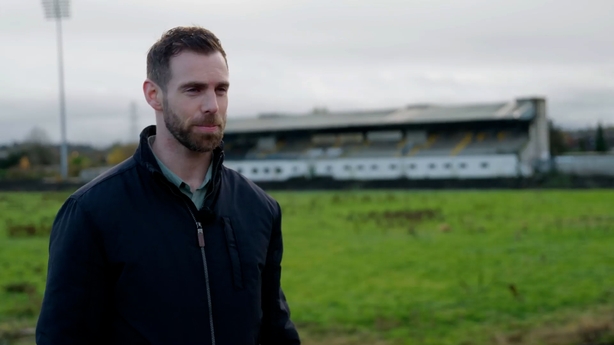
For decades, Casement Park was a home for gaelic games in Belfast, hosting eight Ulster football finals until 1971.
It also has a place in the city’s more difficult history. Occupied for a time by the British army, it was notoriously the backdrop for the murder of two British soldiers, dragged from their car during a funeral and killed by the provisional IRA.
Like many things in Northern Ireland, the future of Casement Park is inextricably linked to its past and decisions on its redevelopment are about more than just sport.
There had been proposals to build a joint football, rugby and GAA stadium at the site of the Maze prison.
When the project was scrapped in 2009 by the DUP, money was instead earmarked individually for the three sports.
Rugby’s Ravenhill was upgraded in 2014 at a cost of £14m, while football and gaelic games were to receive similar amounts of around £60m.
Windsor Park was redeveloped for £25m, but £36m was promised for smaller regional football grounds and they have yet to be built.
The £61.5m earmarked for Casement Park has also been unspent. Until now.
After overcoming a decade of local protests and legal challenges, planning permission was granted for a 34,500-capacity venue just in time to be included in the joint UK and Ireland bid to host football’s European Championships in 2028.
While they say if you build it, they will come, when it comes to football fans it might not be that simple.
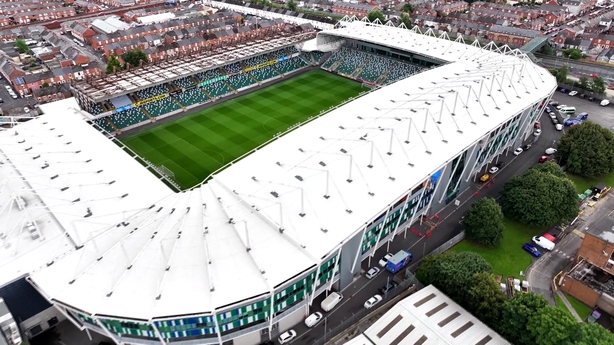
Northern Ireland’s home ground, Windsor Park, is in a majority unionist area of Belfast. Just three kilometres away, Casement Park is in a majority nationalist area.
While qualification isn’t certain, if Northern Ireland are in the Euro 2028 tournament there will be uncomfortable questions around flags and anthems.
A recent Belfast Telegraph/Lucid Talk poll suggested an overall majority support hosting the games in Casement Park. However, 60% of unionists would prefer Northern Ireland to host no matches at all if the gaelic games stadium is the only choice of venue.
"The message to those people who have reservations about coming here is that you will be made incredibly welcome," Mr McManus insisted.
It’s a sentiment echoed by Tom Daly, Chair of the Casement Park Stadium Development Project Board.
"I think that if this can be done successfully it will build a tremendous legacy in terms of how sport is organised, the economy of the city of Belfast, and the overall stabilisation of peace in our society," he said.
Nobody is underestimating the barriers to be overcome.
While there was a rare victory for fans to cheer at Northern Ireland’s international match against Denmark earlier this month, there were also anti-Casement chants.
"You can shove your Casement Park up your h***," sang a section of fans in Windsor Park. A banner reading 'No Casement' was also hung in the stand.
While the majority of fans that spoke to Prime Time said they would go to matches in Casement Park, a number were adamant that they would boycott the tournament, even if Northern Ireland were playing.
The Amalgamation of Northern Ireland Supporters Clubs said it is concerned about the football legacy if games are held in a gaelic games venue. The club stadiums promised money after the Maze plan collapsed are still no closer to development.
"There are clubs throughout Northern Ireland who have been waiting for the same length of time as the GAA on Government funding," said chairman Gary McAllister.
"I think football's governing body should be seen to be leading that battle, not as someone described the IFA recently, as a glorified lobbyist for another sport."
Earlier this month, the Irish Football Association (IFA) Chief Executive appealed to Northern Ireland football fans to back the Euro 2028 games. Patrick Nelson said it was a "pivotal moment for football and society".
But Mr McAllister said the association hadn’t engaged enough with fans and had not given a sufficient answer to calls to explore expanding Windsor Park temporarily.
Its capacity of 18,500 is well below UEFA's minimum requirement of 30,000 and the IFA maintains that there is no route to fund an expansion of the stadium.
"They've said that there's currently no funding available, they haven't said that it's not logistically possible," Mr McAllister argued.
"There's going to have to be some form of temporary seating installed in Casement Park to meet UEFA’s seating requirements. So if it can be done there, why not here?"
Talk of a boycott was premature, Mr McAllister said while the stadium remained unbuilt and qualification uncertain. He insisted that his organisation had spent more than 20 years encouraging fans not to be political.
"So for people to suddenly say that we are now politically motivated and have ulterior motives, I think it's quite disappointing how quickly some people have chosen to disregard all the good work that we have done," he said.
Fans were disappointed that the games would not be in a football stadium, he said and the perception was that another sport would be the main benefactor from government investment.
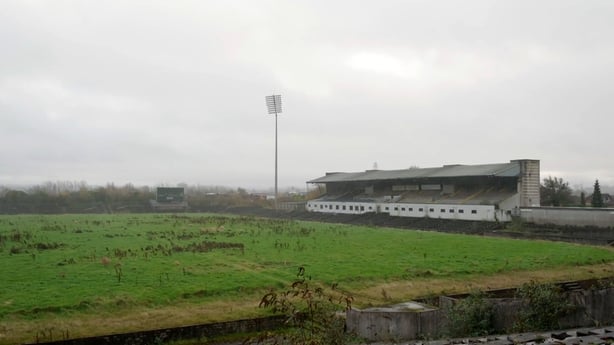
The development of Casement Park is seen by some in the GAA as a way of rebalancing what they view as historic underfunding.
"We need a strategic stadium because of the popularity of Gaelic games in Ulster," project chair Tom Daly told Prime Time.
GAA supporters and players in Ulster were entitled to have modern facilities, he added.
"Whether the European Championships were going to take place in Casement Park in 2028 or not, we were determined to drive on and get our stadium built," he said.
But the project has been beset with problems. In the latest setback, it emerged last week that contractor Heron Bros is not continuing with the job and a new firm will need to be found.
Describing the news as a "bump in the road", Mr Daly said the GAA was moving ahead with enabling works next year in order to speed up progress while a new contractor is found.
"Because of the parameters that are placed on the elevation of the pricing of the works, we couldn't stay within the public procurement regulations and hold on to Heron."
Both the British and Irish governments have committed to helping pay for the stadium. Northern Ireland Secretary of State Chris Heaton-Harris insisted "we'll get the money, don't you worry", while Taoiseach Leo Varadkar said the Government was "happy to assist financially".
However, according to Mr Daly costs are rising due to "hyperinflation" in the construction sector. He said the GAA was working to establish the full costs, but confirmed to Prime Time that it would be higher than the £140m upper ceiling outlined in its annual report earlier this year.
The DUP is insisting the GAA pay more than the £15m it originally committed to the project.
"The costs have roughly doubled, so therefore their contribution should roughly double," said MP Gregory Campbell MP.
"Stormont is going to give extra money but there should be extra money from the GAA, as well as from London and Dublin have indicated that they want to give extra money," he added.
"I think we need to get a better picture of the overall total cost and then see how each of the three sporting codes are going to benefit and how much they're all going to contribute.
"We need to make sure there is a legacy for everybody in this, not just for the GAA."
Asked whether he would attend the Euros at Casement Park, Mr Campbell said assuming the stadium was finished in time and Northern Ireland were playing then, "yes, I would look forward to going".
In response to the DUP call for a much larger GAA contribution, Tom Daly said the partnership with the Irish Government would secure a "significant level of funding coming on top of the exchequer funding from here [Northern Ireland]."
There was a precedent of Irish State investment in GAA stadiums, he said, citing Páirc Ui Chaoimh and Croke Park and noting the peace dividend of a similar facility in Northern Ireland.
"The Irish Government came forward in a very positive way to support those developments in those cities and they're now going to do it in Belfast," he said.
A spokesperson for the Taoiseach said the Government has made clear it is willing to contribute financially to Casement Park and is waiting to hear the revised costs.
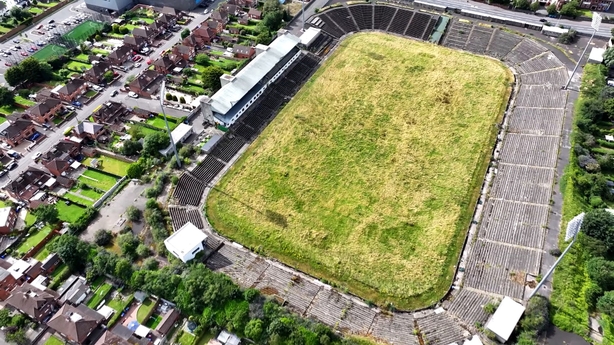
Rejecting the suggestion that the GAA is looking for a blank cheque from the UK and Ireland, Tom Daly said it was asking for commitments made after the collapse of the Maze project to be honoured.
"Ravenhill and Windsor Park have been completed with significant levels of public investment aligned to the costs at that time. Our stadium is yet to be built and we would expect that the commitments entered into at that stage will be honoured."
Construction experts suggest that the precast design of Casement Park means it can be built reasonably quickly but the clock is ticking. UEFA will want to run test events in the stadium before the tournament in 2028.
So is there a Plan B for the Euros if the problems with Casement persist?
Croke Park was offered as a venue by the GAA as part of the original application, however it’s understood that only London was permitted more than one venue per city as part of the joint bid.
"We're working to ensure that such a scenario does not arise and that the games are played in Belfast," Mr Daly added.
Notwithstanding the European Championships, there are those who argue the GAA doesn’t need another large stadium. Not least many in Clones, Co Monaghan, where the Ulster final has been held in recent years. It will inevitably host fewer big matches once Casement Park is completed.
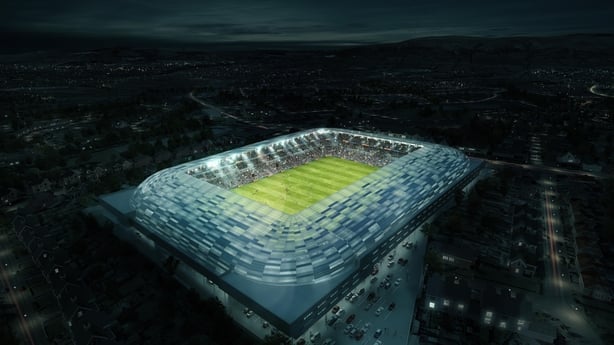
For Antrim hurler Neil McManus, the proposed size of Casement reflects the GAA’s ambition in the city of Belfast.
"There has to be a bit of blue sky thinking. What type of crowds do we want to be bringing to GAA games in the future with Antrim?"
It won’t be Mr McManus running out of the tunnel when Casement is developed. It could even be athletes with names like Haaland or Rashford. But he believes the opportunity to develop the stadium and bring communities together shouldn’t be missed.
"We have a once in a generation opportunity that we must grasp," Mr McManus said.
"We need political leadership to lead and I think the people will row in behind it and we'll look forward to some fantastic games here."
Watch reporter Louise Byrne and producer Isabel Perceval's report on Casement Park on Prime Time tonight at 9.35pm on RTÉ One.







